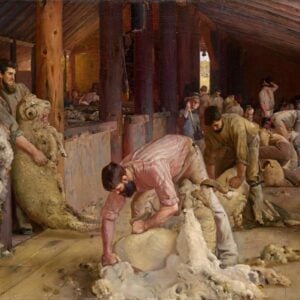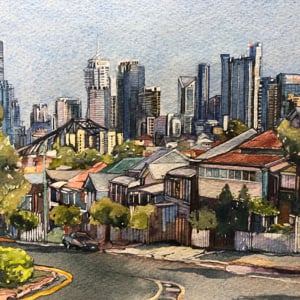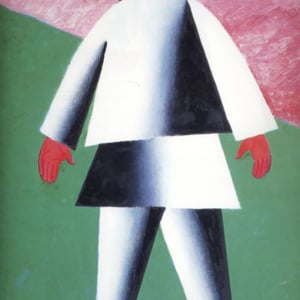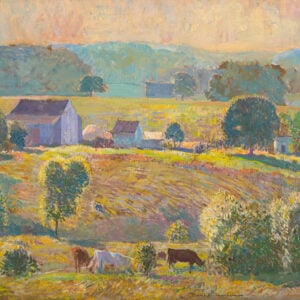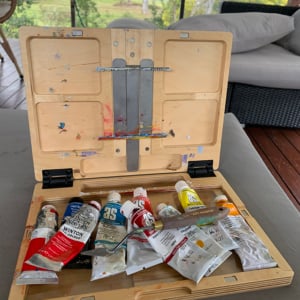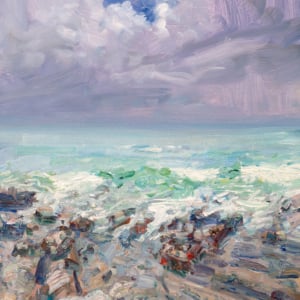I spent the first two months of this year working on just one painting, Elora With Christmas Lights (shown below). During this time, I shunned most of my day-to-day tasks. I ignored social media. I hardly published any new emails, articles, or videos. I didn’t draw or work on other paintings. I basically locked myself in the studio and tunnel-visioned this one painting. That’s the only way I was able to do it justice. Anything less than deep, focused attention for a significant period of time wouldn’t cut it.
The following are some notes and observations on deep work.
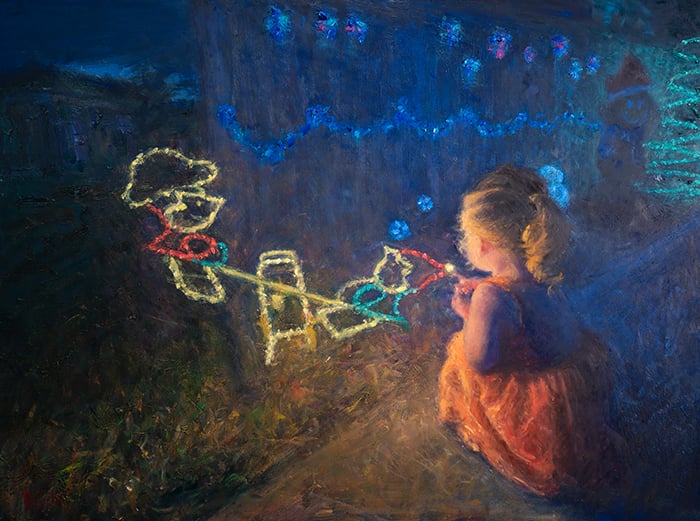
(If you enjoy learning about beautiful art and master artists, you might also be interested in my Exploring the Masters email series. It’s free to join.)
Deep Work Can Feel Hard and Unproductive
It was surprisingly hard to work deeply on this painting for so long. I felt unproductive for the most part, even though I was painting a lot. Each day I had to resist the urge to work on the usual day-to-day stuff. And trust me, this urge was strong! I even found myself pulled towards tasks that I would usually avoid, like scrolling and posting on social media.
There’s a cost you must pay to pursue deep work. I guess that’s why so many people don’t bother. But the rewards at the end tend to far outway the costs, either in the form of pushing yourself to a new level, or the creation of an impressive artwork, or simply in knowing you committed to a major project and followed through.
Going Against Popular Advice
A lot of advice out there is focused on maximizing productivity. There’s constant pressure to do more and more and more. But busy doesn’t equal productive. Sometimes you can get far more done by locking yourself in the studio and working deeply on a single project. If you only ever focus on daily productivity, you’ll likely fall short of your long-term goals.
Of course, there must be a balance. You cannot lock yourself in the studio forever. Life must go on and some responsibilities cannot be shunned. This becomes more apparent as you grow up, get a job, have kids, and take on other adult responsibilities.
What to Work Deeply On?
There’s a mental tax to working deeply. It’s fulfilling but also draining. Do it for too long and you’ll surely burn out. For that reason, you must be selective about what you work deeply on. Don’t throw yourself entirely into every new project. Instead, focus deeply on projects that truly captivate you and warrant your attention. Ask yourself: “Will this project get me a step closer to the artist and person I want to be?” If the answer is no, then keep looking.
A Note for Beginners
If you’re just starting out, it may be counterproductive to work deeply on a single painting or project for weeks or months. You’re likely better off getting your numbers up and getting more paintings under your belt.
As you gain experience, the value of deep work grows and it will become more important to spend time working deeply on challenging projects. If you’re always busy and churning out painting after painting within your comfort zone, you’ll soon plateau. You also won’t get to experience many of the complex aspects of painting that require deep focus and time.
Plan Going Forward
I plan on doing more deep work on challenging projects going forward. At least a few weeks a year. This will keep it interesting and stop me from plateauing. Some ideas I have in mind are:
- A dedicated plein air painting trip in a remote location.
- A super large scale and complex landscape.
- A complex portrait of a loved one.
- Painting in a hard-to-reach or unusual location, such as in the ocean on my kayak.
Over to You
Consider if you need to spend more of your time working deeply on challenging projects. The key is to pick projects that captivate you and seem just out of your skill level. It may not work out, but even if it doesn’t, you’ll surely learn a thing or two.
Thanks for Reading!
I appreciate you taking the time to read this post and I hope you found it helpful. Feel free to share it with friends. If you ever want to learn more, you might be interested in our 30-Day Creativity Kickstart.
Happy painting!
Dan Scott

Draw Paint Academy
PS. A good book on this topic is Deep Work by Cal Newport.

